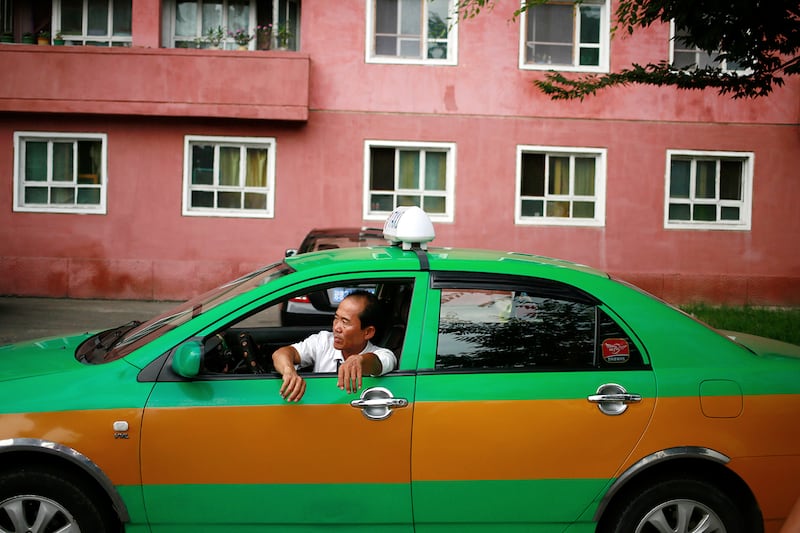Read a version of this story in Korean.
You can earn a dollar a day driving a minivan taxi owned by a rich woman in North Korea — a huge sum that has young men lining up in droves, hoping to be chosen for the job, sources in the country told Radio Free Asia.
Though the taxis are officially part of a government-owned company, in actuality they are privately owned, and competition to be a driver is so fierce that drivers are hired only one day at a time, residents said.
It’s yet another example of the side-hustles that are characteristic in North Korea’s nascent market economy — people cannot support themselves with the salaries at their government-assigned jobs, so most families have to find a way to go into business for themselves.
The private taxis are mostly Chinese minivans purchased by women, who then need to hire men to drive them, because women can’t get licenses in North Korea.
“These days, in Anju, if you drive a minivan taxi for a day, the owner of the taxi will pay you 20,000 won (US$1),” a resident of South Pyongan province, north of the capital Pyongyang, told RFA Korean on condition of anonymity due to safety concerns.
The resident said drivers used to get only 10,000 won (US$0.50) each day, but prices doubled last month because of fluctuations in the exchange rate between the North Korean won and foreign currencies like the U.S. dollar and the Chinese yuan — currencies that people prefer because they are more stable.
De facto privatization
Most companies in North Korea are owned and operated directly by the government, and, at least on paper, the taxi companies are too.
But taxi companies do not own fleets of taxis. Instead these are individually owned vehicles that the owners must register with the company to operate legally. This way, the owner is on the hook for the cost of the vehicle and its maintenance.
The company gets 30% of the profits and the owner gets 70%, a second resident from the same province said.
RELATED STORIES
North Korea Cracks Down on Curfew-Violating Cabs
North Koreans Rely on Smuggled Chinese Vehicles
Smuggling of used cars into North Korea rises amid post-COVID demand
Finding drivers is never a problem, the first resident said.
“Every morning, these wealthy women hire taxi drivers at the vacant lot near the Anju railway station — there are always lots of young men standing in line there,” he said. “If they can drive the taxi for two or three days, they can make more money than a factory worker [earns in a whole month].”
The second resident said that some drivers can earn even more — 50,000-100,000 won (US$2.50-5) — by driving a long-distance taxi that takes customers to locations more than 100 kilometers (62 miles) away.
Women excluded
Although it isn’t legal for women to obtain drivers' licenses, it isn’t exactly easy for men to get them either. Only men who are in the military or work in a factory and are approved by the government are eligible to undergo driver training, which can take three to six months to complete.
After training, successful applicants are awarded a class-4 license. With more training, they can level-up to class-3, which allows them to drive trucks and buses, class-2 for any type of vehicle, and class-1, which is a car designer or manufacturer’s license.
Most would-be taxi drivers aim for at least class-3.

Despite not being legally allowed to drive the taxis themselves, taxi ownership is a way for women to escape the drudgery of having to run a family business — buying and selling goods and services in the marketplaces — while their husbands are off at their government-assigned jobs earning a pittance, the second resident said.
“These women can save up the money they earned at the market and buy a taxi,” he said. “They register it with the local government ... and then they go hire a male driver.”
With the increase in wages for drivers, it’s become an employer’s market because of all the interested applicants, he said.
“In the past, taxi drivers were hired after being introduced through relatives or connections, but not anymore,” the second resident said. “This is because if you hire someone you know, it is difficult to cut off their daily wages in case of poor driving skills or an accident.”
Translated by Claire S. Lee. Edited by Eugene Whong.
